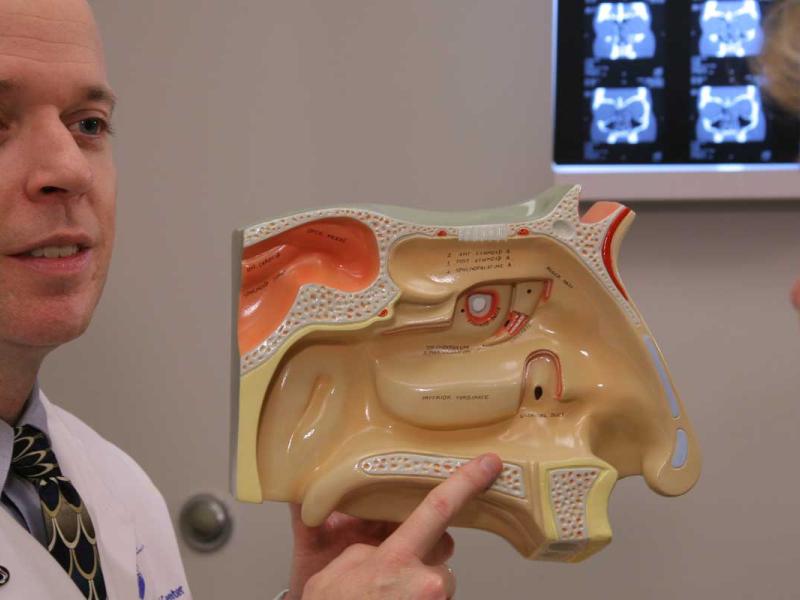Your Sinuses and common sinus condition that can become chronic
Almost everyone has experienced a sinus infection in his or her lifetime. The sinuses are outpouchings from the nose, and scientist are still not clear on why we have them. Most people develop sinuses in the forehead area, cheeks, and between the eyes, although there is some variability amongst individuals. The sinuses are connected to the nose by small openings. When everything is working correctly, your nose and sinuses make about one liter of mucous a day. This normal mucous drains from our sinuses to our nose, and then down the back of the throat where we swallow it. This mucous is important for the natural cleaning process of the nose and sinuses. If the mucous is more than typical, or thicker than usual, we may feel it as post-nasal drainage.
“Sinusitis” is a term frequently applied to a variety of nasal symptoms, but specifically refers to inflammation or infection of the sinus lining. Sinusitis is a common ailment – most people have experienced sinusitis at one point in their lives. Most cases go away without treatment, but your sinuses can inflamed and infected and cause bacterial rhinosinusitis (bacterial sinus infection). If you have bacterial rhinosinusitis, you might need antibiotics, steroids, nasal steroid spray or nasal saline irrigation to help treat your symptoms.
If you have had sinusitis symptoms for more than 12 weeks, it is called chronic sinusitis. If medication is not helping, or if your primary care physician thinks it is related to other health problems, it is time to seek specialized care. Your primary care physician will refer you to one of Penn State Health’s ear, nose and throat (ENT) specialists to assess your symptoms and determine what is causing them.
Your primary care physician might order a computed tomography (CT) scan before your appointment with our ENT specialist. If the imaging isn’t done at Penn State Health, please confirm that a copy of the CT images is sent over ahead of your appointment.
Your exam might include a tiny camera to look inside your nose, nasal passages and the area where your sinuses connect to your nose. After the exam, your ENT will discuss sinusitis treatment options with you and recommend next steps. If medication and nasal irrigation treatments are not successful, your ENT will discuss sinus surgery with you.
Sinus surgery
The Penn State Health otolaryngology team is skilled and experienced in all kinds of sinus surgery. Our techniques are minimally invasive and performed under anesthesia, so you will be asleep during the procedure. In most cases, you can go home the same day.
Sinus surgery enlarges the openings of the sinuses to improve drainage and reduce your nasal symptoms. Prior to your procedure, your surgeon will talk to you about the surgery, how it will be performed, what to expect and any technology that might help you.
Our surgeons use advanced techniques and technology for your comfort and successful treatment. Sinus surgery options at Penn State Health include:
- Balloon sinuplasty. A catheter (small, flexible tube) with a balloon attached is inserted into your inflamed sinus. The balloon expands, enlarging the sinus opening. The surgeon flushes out your sinus with saline and removes the catheter and balloon.
- Image guidance (stereotactic) surgery. Cameras with special sensors create a three-dimensional image to guide the surgeon during complex sinus surgery.
- A drug-eluting stent. A tiny device is placed in the sinus opening, where it expands and delivers medicine to reduce inflammation and help you heal.
Symptoms
When people use the word “sinusitis,” they are usually discussing bacterial sinusitis. Most episodes of bacterial sinusitis begin as a viral illness (cold) and turn into a secondary bacterial infection. Viral illnesses will not respond to antibiotics and typically goes away in a few days to a two weeks. If symptoms last longer than 10-14 days without improvements, then bacterial sinusitis is more likely. Bacterial sinusitis might go away on its own, but you may benefit from prescription treatment. Your physician will let you know if you need antibiotics. You should only take antibiotics when recommended by your physician. Other therapies may include steroids, nasal sprays, and nasal saline rinses.
Sinusitis symptoms are similar to those in many other diseases. Viral illnesses like colds, bacterial sinusitis, allergies and other irritants can give you similar symptoms. Symptoms of sinusitis may include:
- Cough
- Decreased sense of smell
- Facial pressure or pain that might get worse when you lean forward
- Fever
- Pain in the upper teeth
- Postnasal drip (mucus collects at the back of your throat and “drips”)
- Stuffy or runny nose
Diagnosis
During your appointment, your otolaryngologist will review your symptoms and discuss potential nasal and sinus diagnoses and treatment options. If you have been experiencing symptoms for more than 12 weeks, your physician may order a CT scan, which is the most effective diagnostic test for sinus concerns.
Outlook
Complications or severe problems from sinusitis are rare; however, sinusitis can keep you from fully enjoying life. You don’t have to live with the discomfort – we’re here to help. Our Penn State Health team is here for all of your sinusitis needs and to get you back to living your best life.
Experts in Care
Meet our doctors, view their profiles and select the one that’s right for you.
Find a doctor near youWhy Choose Penn State Health for Care
The otolaryngology experts at Penn State Health are committed to providing our patients with the most comprehensive ear, nose and throat care. We know that sinusitis can affect your daily activities. Our team works closely with patients to determine the cause of your sinusitis and provide cutting-edge treatment options. When necessary, we will partner with other providers in Allergy and Immunology, Ophthalmology, Pulmonology, Neurology, and Neurosurgery to provide the highest quality of care. We are also committed to furthering ear, nose and throat research and clinical trials in partnership with Penn State College of Medicine. To learn more about clinical trials available at Penn State Health, visit our StudyFinder.
Support Groups
Support groups provide an opportunity to share your feelings and connect with other patients and caregivers who are experiencing similar struggles.
Convenient Locations
Find the care your family needs, close to home, at one of our many locations throughout central Pennsylvania.
Find a location near you





